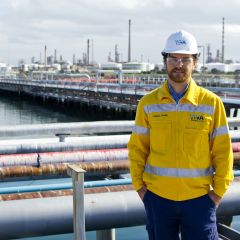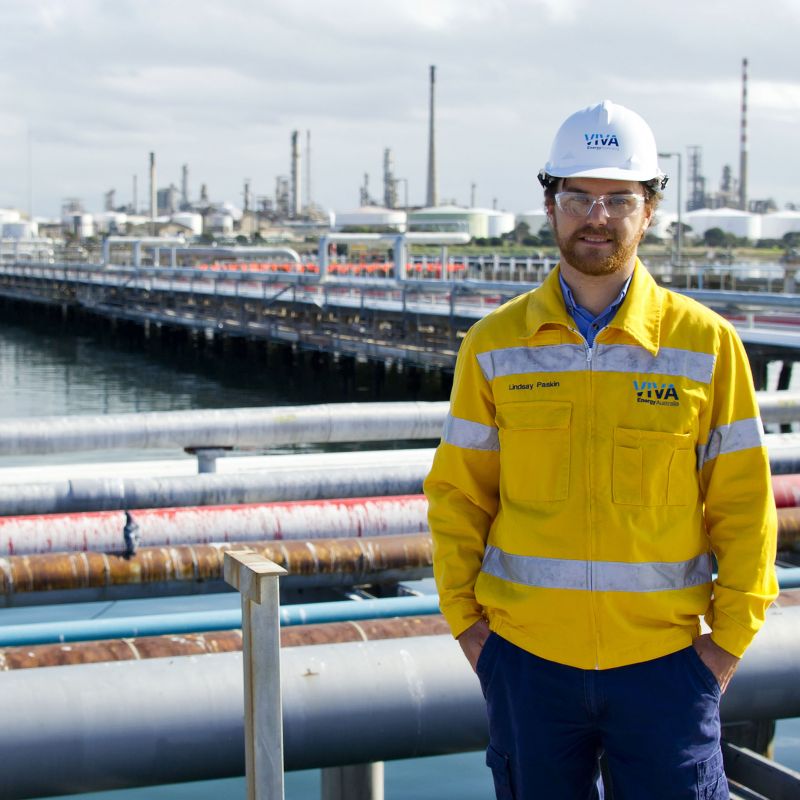Extensive seafaring experience has helped one nautical science graduate become a leader in his field – this time in an onshore role.
Lindsay Paskin was the chief officer on an ocean-going ship and recently transitioned to a land-based role with one of Australia’s leading energy companies, Viva Energy.
As a Marine Technical Advisor in the Supply and Trading team, Mr Paskin provides technical support to the marine activities of Viva Energy, mainly the shipping and handling of crude oil and petroleum products at the company’s Geelong Refinery and 24 marine supply terminals, as well as the sale and marine supply of fuels to commercial customers.
The role involves providing the supply team and refinery with shipping support, liaising with range of stakeholders from harbour masters to ship owners to help develop and improve the supply chain, reviewing ships to ensure they are acceptable for use, and visiting and providing assurance to the company’s marine terminals and operations around the country.
It’s a perfect fit for Mr Paskin, whose time at sea as second-in-command saw him in charge of the loading and discharging of cargo fuel and the maintenance of the ship.
“My knowledge, skills and background on the water have allowed me to take a new approach to marine supply-chain efficiencies and marine cargo-handling operations,” he said.
“I spent my time at sea working with both International and Australian ports and terminals – it gave me a different experience of and unique exposure to the complexities of marine operations.”
Growing up in a fishing family, with an affinity for boats, Mr Paskin’s first foray into a maritime career was working for a local ferry company while still in high school.
A desire to pursue a career on larger, blue water vessels led him to AMC and the Advanced Diploma of Applied Science (Nautical Science).
“The nautical science degree included both on campus study incorporating extensive theory and practical components; and a distance-learning piece for guided study during sea-time phases. This two-tiered approach allowed me to exercise the theory in a practical environment – under the guidance of seagoing maritime professionals,” he said.
Having made the transition to land, as a master mariner Mr Paskin is in the unique position of being able to advise his team on marine issues and provide solutions.
“We rely on ships to transport over 90 per cent of petroleum to our supply terminals. Having that knowledge base on the marine technical team allows us to very efficiently deal with problems as they arise,” he said.
“I also may be able to view issues or identify problems that might not be readily apparent to someone who hadn’t had the experience at sea.”
That was evidenced during Viva Energy’s recent work with the Royal Australian Navy, where Mr Paskin led the thinking to modify navy supply vessels to make them more compatible with the company’s terminals across the country.
“I don’t think that’s something that’s been attempted by previous suppliers to the Navy – or by the Navy itself. We identified a gap – that some naval vessels aren’t immediately compatible with commercial terminals. But using a small piece of equipment, we were able to make these vessels meet commercial terminal compatibility and bridge that gap,” he said.
With a focus on finding safe, cost-effective and efficient outcomes, Mr Paskin’s aiming to stay on land and continue his career in the wider supply chain industry, where he can continue to draw on his maritime knowledge.
Published on: 13 Dec 2017

